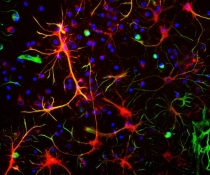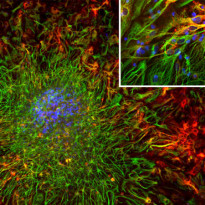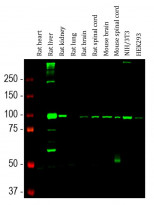ARG10691
anti-ALDH1L1 antibody [2E7]
anti-ALDH1L1 antibody [2E7] for ICC/IF,IHC-Frozen sections,Western blot and Human,Mouse,Rat,Cow,Horse,Pig
Overview
| Product Description | Mouse Monoclonal antibody [2E7] recognizes ALDH1L1 |
|---|---|
| Tested Reactivity | Hu, Ms, Rat, Cow, Hrs, Pig |
| Predict Reactivity | Chk |
| Tested Application | ICC/IF, IHC-Fr, WB |
| Host | Mouse |
| Clonality | Monoclonal |
| Clone | 2E7 |
| Isotype | IgG1 |
| Target Name | ALDH1L1 |
| Antigen Species | Human |
| Immunogen | Synthetic peptide around aa. 402-902 of Human ALDH1L1. |
| Conjugation | Un-conjugated |
| Alternate Names | 10-fTHF; EC 1.5.1.6; FDH; Aldehyde dehydrogenase family 1 member L1; FTHFD; 10-FTHFDH; Cytosolic 10-formyltetrahydrofolate dehydrogenase |
Application Instructions
| Application Suggestion |
|
||||||||
|---|---|---|---|---|---|---|---|---|---|
| Application Note | * The dilutions indicate recommended starting dilutions and the optimal dilutions or concentrations should be determined by the scientist. |
Properties
| Form | Liquid |
|---|---|
| Purification | Affinity purification. |
| Buffer | PBS and 50% Glycerol. |
| Stabilizer | 50% Glycerol |
| Concentration | 1 mg/ml |
| Storage Instruction | For continuous use, store undiluted antibody at 2-8°C for up to a week. For long-term storage, aliquot and store at -20°C. Storage in frost free freezers is not recommended. Avoid repeated freeze/thaw cycles. Suggest spin the vial prior to opening. The antibody solution should be gently mixed before use. |
| Note | For laboratory research only, not for drug, diagnostic or other use. |
Bioinformation
| Database Links | |
|---|---|
| Gene Symbol | ALDH1L1 |
| Gene Full Name | aldehyde dehydrogenase 1 family, member L1 |
| Background | The protein encoded by this gene catalyzes the conversion of 10-formyltetrahydrofolate, nicotinamide adenine dinucleotide phosphate (NADP+), and water to tetrahydrofolate, NADPH, and carbon dioxide. The encoded protein belongs to the aldehyde dehydrogenase family. Loss of function or expression of this gene is associated with decreased apoptosis, increased cell motility, and cancer progression. There is an antisense transcript that overlaps on the opposite strand with this gene locus. Alternative splicing results in multiple transcript variants. [provided by RefSeq, Jun 2012] |
| Calculated MW | 99 kDa |
Images (4) Click the Picture to Zoom In
-
ARG10691 anti-ALDH1L1 antibody [2E7] ICC/IF image
Immunocytochemistry: Rat Neuron-glia cell mixed cultures stained with ARG10691 anti-ALDH1L1 antibody [2E7] (red) and co-stained with chicken polyclonal antibody against vimentin (green). Blue is a DNA stain. ARG10691 anti-ALDH1L1 antibody [2E7] stains astrocytic cell bodies and processes. The fibroblastic cells contain only vimentin and so are green, while astrocytes contain either vimentin and ALDH1L1, so appearing golden, or predominantly ALDH1L1, in which case they appear red.
-
ARG10691 anti-ALDH1L1 antibody [2E7] ICC/IF image
Immunofluorescence: Cortical neuron-glial cells from E20 Rat stained with ARG10691 anti-ALDH1L1 antibody [2E7] (red) at 1:1000 dilution and costained with ARG52313 anti-GFAP antibody (green) at 1:5000 dilution. Hoechst (blue) for nuclear staining.
Clone 2E7 produces cytoplasmic staining of glial cells, while the GFAP antibody labels the intermediate filament cytoskeleton in astrocytes and other glial cells. Some astrocytic cells express both ALDH1L1 and GFAP and therefore appear yellow.
-
ARG10691 anti-ALDH1L1 antibody [2E7] WB image
Western blot: Rat liver tissue homogenates stained with ARG10691 anti-ALDH1L1 antibody [2E7].
-
ARG10691 anti-ALDH1L1 antibody [2E7] WB image
Western blot: Rat heart, Rat liver, Rat kidney, Rat lung, Rat brain, Rat spinal cord, Mouse brain, Mouse spinal cord, NIH/3T3 and HEK293 cell lysates stained with ARG10691 anti-ALDH1L1 antibody [2E7] (green) at 1:5000 dilution.









